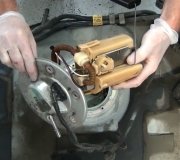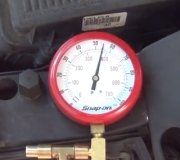It's going to smoke a little and the engine will be well-lubricated.
Diesel fuel is much harder to ignite than is gasoline. Diesel engines have a higher compression ratio to squeeze the fuel and air more. The resulting very high pressure causes the temperature to go up a lot. That high temperature is what causes diesel fuel to ignite when it is sprayed into the engine.
Gas engines have a much lower compression ratio, so the temperature doesn't go up as much. That's why they need spark plugs to ignite the fuel. The other big difference is diesel fuel is sprayed in just at the exact time it is supposed to ignite, and it does so almost instantly. Gasoline is sprayed into the air stream earlier, then it gets drawn in along with the air, then it's compressed. It's up the spark plug to fire at the exact time to start the fuel burning. That gas is sprayed in at roughly 50 pounds of pressure to make it atomize, or turn into a mist. Diesel fuel is sprayed in at as much as 2000 pounds to get it to atomize. Liquid fuel doesn't burn. It has to be in vapor form to burn.
What all of this means is the diesel fuel is not going to vaporize well, so to burn it, that will require the gas to burn first. The heat will vaporize the diesel fuel and make it burn, but that will be after it has entered the exhaust system. Burning any fuel late can create very high temperatures in the catalytic converter. Over a long period of time, that might lead to melting the catalyst causing the converter to become plugged. My suspicion is if the engine ran okay for 70 miles, the diesel fuel was probably diluted enough by the gasoline, that engine performance was normal. Damage to the engine itself is unlikely. Gasoline is a relatively dry fuel with no lubricating properties. Engines has to be designed with that in mind. Diesel fuel is somewhat of a lubricant. It is thicker than gasoline and will gel in cold weather.
There's obviously enough gas, by percentage, for the engine to run. What I would do is run the tank to near empty, then fill with fresh gas. It's only if there are performance problems that I would add more gas first. By repeatedly adding gas to a half-full tank, it will dilute the diesel fuel more and more, but there will always still be some in there. I'd rather get as much out right away as possible.
Even if the engine runs okay, it may be hard to get it started, especially when it's cold. That will clear up once the diesel fuel has been used up.
Tuesday, May 4th, 2021 AT 4:48 PM


